Endless Obstacles
The frustrations and obstacles were endless. Just before they left they were forced
to pay an added fee. Bradford wrote in a letter, "We are in such a strait at present,
as we are forced to sell away 60 worth of our provisions..." that put them into
"great extremities…." They had to sell things that they desperately needed
in the new world. Finally this little group of people who had no money and practically no
personal possessions set off to a savage world in the middle of autumn. In Luke 13 we read
of the Parable of the Mustard Seed. Jesus said, "What is the kingdom of God
like? And to what should I compare it? It is like a mustard seed that someone
took and sowed in the garden; it grew and became a tree, and the birds of the air made
nests in its branches." Who could have seen that this little band of people
were the mustard seed of the great tree of America that in the future would be the
greatest nation on earth inspiring the world with its freedom and wealth.
True Commitment
The Pilgrims had true commitment. Their faith saw them through. Their situation was
desperate. They traveled in the fall which made a more dangerous voyage. They did not have
money or skills but great courage and firm faith. They were bold. They knew God was with
them. All their troubles at sea and in America they saw was a test to weed out the weak
and timid. The Strangers were the seeds of secularism. The majority was not religious but
the leadership was. Yet they triumphed. Bradford wrote that God was with them and gave
them endurance, "Our fathers were Englishman which came over this great ocean, and
were ready to perish in this wilderness but they cried unto the Lord, and He heard their
voice .... Let them therefore praise the Lord, because He is good! and His mercies endure
forever."
It is generally thought by Americans that the Mayflower company was a homogenous
religious group. They were a minority and there was considerable friction between the
pilgrims and the others.
At first the weather was good, but then came "many fierce storms with 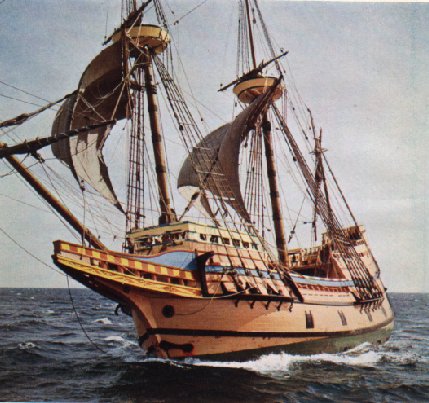 which the ship was shrewdly
shaken", in Bradford's typically lucid style. The screaming wind, tossing the
Mayflower, terrified the Pilgrims. They became exhausted. They were chilled to the bone.
Waves of icy water would splash over the ill and frightened passengers, tasting like
tears, their hearts pounding as mountains of water pounded the tiny ship. Water crashed
about everywhere, and the foul smells reeking among the huddled people made them all sick.
It was almost impossible to sleep and every ragged nerve begged for rest.
which the ship was shrewdly
shaken", in Bradford's typically lucid style. The screaming wind, tossing the
Mayflower, terrified the Pilgrims. They became exhausted. They were chilled to the bone.
Waves of icy water would splash over the ill and frightened passengers, tasting like
tears, their hearts pounding as mountains of water pounded the tiny ship. Water crashed
about everywhere, and the foul smells reeking among the huddled people made them all sick.
It was almost impossible to sleep and every ragged nerve begged for rest.
There were no oilskins or rubber clothing for the crew or the passengers. The only
way to dry out when they got wet was to wait until the sun came out. People never
undressed or changed clothes all the way across.
They set off in the worst time of the year, when storms raged over the Atlantic. It
took twice as long as it would have in good weather. The finally arrived after 66 days
instead of the usual 30.
The Mayflower was an undistinguished vessel amid the wealth and learning and
prestige in England and Holland. The Pilgrims were safe in Holland. They had money and
security, but they gave up their material possessions, their families, their country, and
even their lives. The Mayflower carried some of the bravest individuals who ever put to
sea. They were young men and women of incredible fortitude. They knew they were part of
"the great design." They never for a moment were hesitant or doubting. The
delays were maddening and when finally the Mayflower was ready to sail it was in the fall,
the worst time of the year. Still they went. God can't wait until everything is
picture perfect.
They were mainly uneducated, young and of the lower class. This little band of
pioneers looked totally undistinguished, but they were God's chosen people to lay the
foundation for America. They were smart in the truest sense because they prayed for
guidance from God, gave thanks for every good thing they received, and they pledged to God
determination to stand up to any obstacle. They were open to new scientific discoveries.
They emphasized God and values over material things. Their leaders were receptive to
liberty of thought. The values they cherished were the same ones generations have used and
respected.
They were honest and dealt fairly with one another and with all they met. It would
not occur to them to be egotistical. Moral courage was a natural part of their daily
existence. They never looked back and saw what they were doing as a great mission for God.
In the Bible we read that Jesus used ploughing as a metaphor for total dedication to a
cause. In Luke 9 we read how strongly he speaks of commitment - even to the point of
leaving one's family: "To another he said, 'Follow me.' But he said, 'Lord, first let
me go and bury my father.' But Jesus said to him, 'Let the dead bury their own dead; but
as for you, go and proclaim the kingdom of God.' Another said, 'I will follow you,
Lord; but let me first say farewell to those at my home.' Jesus said to him, 'No one who
puts a hand to the plow and looks back is fit for the kingdom of God.'" The Pilgrims
never looked back and never went back. They always advanced.
Ship like a terrible slum
The crowded living conditions, the meager diet, never being able to bathe, stay dry
and having to wear the same clothes for two months had undermined their health. Most were
coughing and sick. The air in the crowded quarters was nauseating at best and usually
simply staggering. They were never warm and dry.
On the long voyage the filthy smell was incredible. There were rats and cockroaches.
The flour and ship's biscuits went moldy and produced weevils and maggots. Some ate their
biscuits only when it was dark, so that they need not see the bugs in it. There was no
bathroom – only buckets. They had no privacy. The tossing and rolling of the ship in
rough water made most seasick. The vomit from the seasickness added to the stench.
Sea water kept their clothing and blankets wet through the entire voyage.
The fierce winds and storms moved the devout Pilgrim Saints to sing songs for hours
at a time. They prayed with tears coursing down their cheeks, terrified but determined to
never give up. The Strangers would shout and jeer at the Pilgrims. The Pilgrims thought
that God was angered by the sinful beliefs of the Separatists and would sink the ship. The
Strangers could not stop the Pilgrims from continuing to sing though.
Even though the ship was crowded, the Pilgrims would have church meetings every
morning during the trip.
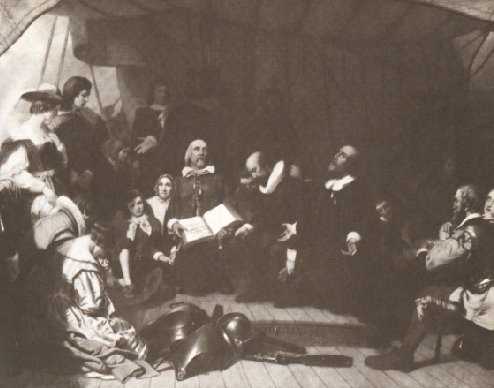
The sailors were coarse and unsympathetic and often made fun of their
devotionals.
Tensions high
Tensions were high on the Mayflower's long voyage between the Saints and the
Strangers. The sailors hated the pious ways of the Pilgrims "cursing them daily with
grievous execrations." The Pilgrims said nothing. One young seaman especially taunted
the weak and sick Pilgrims. He was strong and healthy and swore at them. Stepping over and
around the crammed men, women, and children, he cracked vicious jokes telling them
constantly that he would like to throw them overboard. He taunted the Pilgrims saying he
expected to bury half of them at sea. When they gently reproached him, "he would
curse and swear most bitterly." One morning he became sick and this "proud and
profane young man" was dead by afternoon. He was the only person to die during the
voyage. It astonished the crew. The Pilgrims knew this was punishment for persecuting
God’s chosen people. They correctly saw everything from a spiritual point of view.
Everything had heavenly meaning and heavenly cause and effect.
Bradford wrote, "Thus his curses light on his own head, and it was an
astonishment to all his fellows for they noted it to be the just hand of God upon
him." This was a neat Providential sign. Everything that happened to them had
providential meaning. To read Bradford and those others who kept a record is like reading
the Bible. God's hand was working everywhere.
Like the exodus of Moses
The Pilgrim story is like the exodus of Moses.
It was rare that one ship would travel alone, because it was dangerous for only one
ship to make such a long voyage. They were one tiny ship alone on a huge ocean. They had
no support but God.
The prospects of victory looked dim for the Pilgrims. They left too late in the
season for a fair voyage. They were ignorant of how to survive in a wilderness. But as one
writer said, "they had something better than money and skills – stout courage
and firm faith."
In the middle of this terror, Elizabeth Hopkins had a baby, Oceanus, named after the
ocean.
During one fierce storm halfway across the ocean a main beam cracked under the
strain and bent. They feared for their safety. This caused the main deck to leak rain and
sea water. The passengers were drenched. Should they go on or turn back? The sailors
wanted to turn back, but the Pilgrims broke out a "great iron screw brought out of
Holland" to be used for raising houses – and used this mechanical jack to lift
the cracked beam in place.
It was not by accident or luck that they had brought a "great iron screw."
After using the jack, they "committed themselves to the will of God, and
resolved to proceed."
When the Pilgrims met to conduct their morning devotions on the deck of the
Mayflower in the cold dreary winter, they always gave thanks and gave God their pledge to
never give up. Brewster had said just before sailing for the New World, "It is
not with us as with other men, whom small things can discourage, or small discontents
cause to wish themselves home again. We believe and trust that the Lord's with us, unto
whom and whose service we have given ourselves, and that he will graciously prosper our
endeavors according to the simplicity of our hearts therein."
Arrive at Cape Cod, Massachusetts - November 21,
1620
After two months of agony, they arrived at is today Cape Cod in Massachusetts.
It was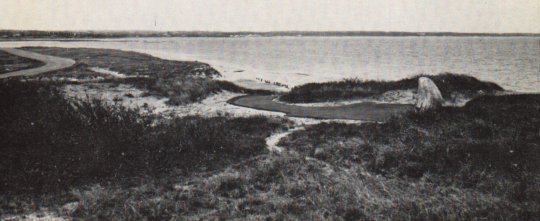 November 21.
They had arrived in the dead of winter. The first thing they did was fall on their
knees and praise God. Bradford writes these famous words: "Being thus arrived
in a good harbor, and brought safe to land, they fell upon their knees and blessed the God
of Heaven who had brought them over the vast and furious ocean, and delivered them from
all the perils and miseries thereof."
November 21.
They had arrived in the dead of winter. The first thing they did was fall on their
knees and praise God. Bradford writes these famous words: "Being thus arrived
in a good harbor, and brought safe to land, they fell upon their knees and blessed the God
of Heaven who had brought them over the vast and furious ocean, and delivered them from
all the perils and miseries thereof."
"But here I cannot but stay and make a pause, and stand half amazed at this
poor people's present condition; and so I think will the reader, too, when he well
considers the same. Being thus passed the vast ocean, and a sea of troubles before in
their preparation (as may be remembered by that which went before), they had now no
friends to welcome them nor inns to entertain or refresh their weatherbeaten bodies; no
houses or much less towns to repair to, to seek for succour. It is recorded in Scripture
as a mercy to the Apostle and his shipwrecked company, that the barbarians showed them no
small kindness in refreshing them, but these savage barbarians, when they met with them
(as after will appear) were readier to fill their sides full of arrows than otherwise. And
for the season it was winter, and they that know the winters of that country know them to
be sharp and violent, and subject to cruel and fierce storms, dangerous to travel to known
places, much more to search an unknown coast. Besides, what could they see but a hideous
and desolate wilderness, full of wild beasts and wild men – and what multitudes there
might be of them they knew not. Neither could they, as it were, go up to the top of Pisgah
[the mountain top where Moses saw Canaan] to view from this wilderness a more goodly
country to feed their hopes; for which way soever they turned their eyes (save upward to
the heavens) they could have little solace or content in respect of any outward objects.
For summer being done, all things stand upon them with a weather-beaten face, and the
whole country, full of woods and thickets, represented a wild and savage hue. If they
looked behind them, there was the mighty ocean which they had passed and was now a main
bar and gulf to separate them from all the civil parts of the world."
Bradford wrote of their determination in simple, virile language reminiscent of the
Bible, "What could now 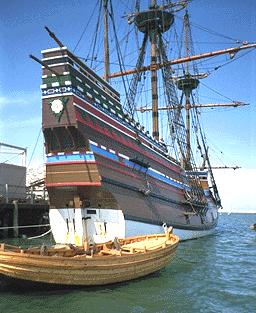 sustain them but the Spirit of God and His grace? May not and ought not the children of
these fathers rightly say: ‘Our fathers were Englishmen which came over this great
ocean, and were ready to perish in this wilderness; but they cried unto the Lord, and He
heard their voice and looked on their adversity,’... ‘Let them therefore
praise the Lord, because He is good: and His mercies endure forever.’ ‘Yea, let
them which have been redeemed of the Lord, show how He hath delivered them from the hand
of the oppressor. When they wandered in the desert wilderness out of the way, and found no
city to dwell in, both hungry and thirsty, their soul was overwhelmed in them. Let them
confess before the Lord His loving kindness and His wonderful works before the sons of
men.’"
sustain them but the Spirit of God and His grace? May not and ought not the children of
these fathers rightly say: ‘Our fathers were Englishmen which came over this great
ocean, and were ready to perish in this wilderness; but they cried unto the Lord, and He
heard their voice and looked on their adversity,’... ‘Let them therefore
praise the Lord, because He is good: and His mercies endure forever.’ ‘Yea, let
them which have been redeemed of the Lord, show how He hath delivered them from the hand
of the oppressor. When they wandered in the desert wilderness out of the way, and found no
city to dwell in, both hungry and thirsty, their soul was overwhelmed in them. Let them
confess before the Lord His loving kindness and His wonderful works before the sons of
men.’"
The 40 days from November 21 to the end of the year December 31, would be ones of
tragedies and triumphs as they began the search for their new land and begin building
their first shelter. On their calendar it was November 11 when they arrived, but
November 21 is the day we celebrate because our calendar was updated later. One month
later on December 21st of our calendar we celebrate "Forefather's Day" when the
first of the Pilgrims landed at Plymouth.
Mayflower Compact
They were sailing to Virginia, but God diverted them north. When they arrived, some
of the passengers said they could go wherever they pleased. The Pilgrim leaders knew they
needed unity to be strong and safe in the New World. They immediately took charge by
giving strong decisive leadership.
The Pilgrims took charge immediately and drew up the Mayflower Compact – a
document which pledged they would govern themselves by abiding to God's laws.
Some felt they didn't have to honor the papers they signed because they 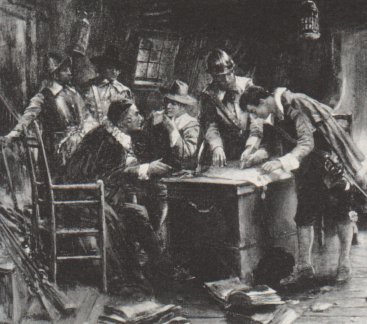 were outside Virginia. They were
in New England. The Pilgrims would not allow for mutiny or disunity. They formed a hasty
conference. They borrowed Captain Jones’s cabin. William Brewster brought his writing
materials. Those who plotted mutiny could hear their voices and the scrabble of a quill
pen. Then the Pilgrims gathered the other men.
were outside Virginia. They were
in New England. The Pilgrims would not allow for mutiny or disunity. They formed a hasty
conference. They borrowed Captain Jones’s cabin. William Brewster brought his writing
materials. Those who plotted mutiny could hear their voices and the scrabble of a quill
pen. Then the Pilgrims gathered the other men.
One book says, "The reading of the Compact was followed by tense
discussion. John Carver was the first to step up and sign. The leading Saints
followed him. There was a long pause. Would the Strangers accept the
agreement? The fate of the settlement hung on their decision."
"With the rattle of his saber, Captain Myles Standish rose up to his full
height and then marched to the front of the cabin and set his name down on the side of law
and order. Everyone breathed easier. The most prosperous of the Strangers
followed him." And then the rest signed.
The minority, as usual in history, dominated the majority. Their unity and
strength influenced all the rest to sign it. This small minority group had clear vision
and unity that gave them the power to guide the majority. The Mayflower Compact was a
document signed for unity under God. It was a document of unification.
The agreement the Pilgrims signed was not with the Virginia Company – a Royal
charter. Their agreement was only a business contract in which the financiers had no
authority to promulgate ordinances and decrees or to appoint the governor of the colony.
So the Pilgrims at Plymouth could invent their own politics. It is significant that the
first governor of Plymouth was the first governor in history to be chosen by democratic
means in a free election. Of all the political systems, God is for democracy.
The word covenant was a commonly used word at the founding of our nation. In the
case of the Pilgrims it meant a solemn agreement between God and an individual. The
founding Pilgrims were Biblicists who knew God obeyed his side of an agreement.
Deuteronomy 7:9 says: "Know therefore that the Lord thy God, He is God, the faithful
God, which keepeth covenant and mercy with them that love Him and keep His commandments to
a thousand generations." God's people are supposed to build for a thousand
generations. We are supposed to look far into the future and build an empire for
God. Rev. Moon does this.
The fundamental reason America has become so prosperous is because of the covenant
of our forefathers. Before the Pilgrims set one foot in the New World they drew up a
covenant before God. Before launching their colony they recognized God's sovereignty. They
joined with God; they obeyed God. The Mayflower Compact begins in big bold letters
"In the Name of God, Amen." They took this vow seriously and other colonies in
this new Eden did so as we moved toward nationhood. Prof. Andrew McLaughlin in Foundations
of American Constitutionalism writes, "... the word 'covenant' and its
significance will appear over and over again as we trace the development of America’s
constitutional history.…"
Our forefathers made covenants with God, and America needs to restore, revive and
reaffirm those contracts. God has not changed, but many Americans have forgotten our
agreement with God.
The Mayflower Compact
IN THE NAME OF GOD, AMEN.
"We whose names are underwritten, the loyal subjects of our dread Sovereign
Lord King James, 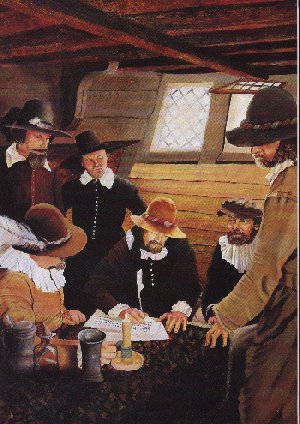 by the
Grace of God of Great Britain, France, and Ireland King, Defender of the Faith, etc."
by the
Grace of God of Great Britain, France, and Ireland King, Defender of the Faith, etc."
"Having undertaken, for the Glory of God and advancement of the Christian Faith
and Honour of our King and Country, a Voyage to plant the First Colony in the Northern
Parts of Virginia, do by these presents solemnly and mutually in the presence of God and
one of another, Covenant and Combine ourselves together into a Civil Body Politic, for our
better ordering and preservation and furtherance of the ends aforesaid; and by virtue
hereof to enact, constitute and frame such just and equal Laws, Ordinances, Acts,
Constitutions and Offices, from time to time, as shall be thought most meet and convenient
for the general good of the Colony, unto which we promise all due submission and
obedience. In witness whereof we have hereunder subscribed our names at Cape Cod, the 11th
of November, in the year of the reign of our Sovereign Lord King James, of England, France
and Ireland the eighteenth, and of Scotland the fifty-fourth. Anno Domini 1620."
Bradford then makes a comment that the strangers always complained (Bradford, like
all spiritual pioneers has to listen to complaining like Moses did), but the strength of
character of the Pilgrims kept them in line: "In these hard and difficult beginnings
they found some discontents and murmurings arise amongst some, and mutinous speeches and
carriages in other; but they were soon quelled and overcome by the wisdom, patience, and
just and equal carriage of things, by the Governor and better part, which clave faithfully
together in the main."
In The Mayflower Compact Frank Donovan writes, "the Compact was an
extraordinary document for its day, in that it set forth revolutionary new
principles. It was a milestone on the long, hard, bloody road from feudalism and the
rule of an aristocracy that had dominated the people of the Old World for centuries.
It is more remarkable for the attitudes, the beliefs, the ideas, the state of mind -- call
it what you will -- of the men who brought it into being than for what is specifically
says."
"The key words are, 'to combine ourselves together into a civil body politic
... to enact ... just and equal laws.' This was the first simple and direct written
expression in recorded history of what the French philosopher Jean Jacques Rousseau would
call the 'social contract' theory of government, the theory on which the government of the
United States is based."
"Under the social contract theory of government, laws are not made, nor are the
lives of the people ordered, by kings or nobles or appointed counsels, or by a
dictatorship of any class or individual. ... At the time the Compact was written
such a concept of government was completely radical. There were no such governments
in the Old World."
"Another revolutionary principle in the Compact, for the times, is expressed in
the words 'just and equal laws.' There had been just laws in England since the time
of the Magna Carta, but nowhere in the Old World were there equal laws, at least in their
application. The law was one thing for the poor and underprivileged, another for the
rich and well born. There were records of poor children in England who were hung for
the minor theft of a silver spoon or a watch. But no noble's son was ever hung, or
even punished by the law, for such an offense."
Democracy vs. Theocracy
God was behind this budding democracy. He wanted America
to be democratic. And God wants his future ideal world to be democratic and
free. The Puritans came 10 years after the Pilgrims and created a theocracy.
Unfortunately America, in the 20th century, has given government too much power to
regulate lives, just as the Puritans did. There are harsh penalties for victimless
crimes. This is not God's way. The Pilgrims could be harsh sometimes, as was
the world they lived in. But they were far less harsh than the Puritans.
America should return to its roots of freedom from heavy government. There are a
number of books out that fear Rev. Moon, thinking he will oppress people as the Puritans
did when he or his church gains control. The world should not fear Rev. Moon.
He is for the use of persuasion, not force, even for what is considered sinful acts.
Ironically, some who fear the most use violence against him and his followers such as
using forceful kidnapping of adult members called by the misnomer
"deprogramming." God's way is not to initiate force and for the use of
maximum freedom. Those members of his movement who advocate government regulations of such
things as guns, prostitution, drugs, pornography, etc. are only being in the Cain
tradition of the Puritans. This is a vast topic and I discuss this fully in my book
The Keys to Building the Ideal World. (www,DivinePrinciple,com).
Just because they wrote and signed the Compact did not mean that there was
unity. The first few months at Plymouth were horrendous and the stress was
overwhelming. Some people were not very patient and godly but the Pilgrims were
magnificent in calming the majority.
First Exploration
When the Pilgrims reached Cape Cod they thanked God for making it over the
ocean. They were eager "again to set their feet on the firm and stable
earth."
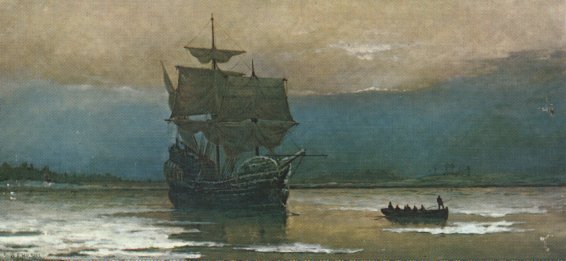
The Pilgrims had brought along a few small boats and a large boat called a shallop
to be used for exploring the shore line. The very first landing party, the first
expedition to explore the coast was 16 men with musket, sword and armor led by a military
man, Captain Myles Standish. 16 men – a providential number. In the Korean War 16
nations fought against communist aggression.
They saw 5 or 6 Indians who fled when they saw the Pilgrims. Standish, always
fearless and aggressive, ran after them. The swift running Indians disappeared into
the woods.
God’s Gift
They roamed around the area and came across a heap of sand. They dug into it and
found to their amazement ten large baskets of yellow, red, and blue maize Indian seed corn
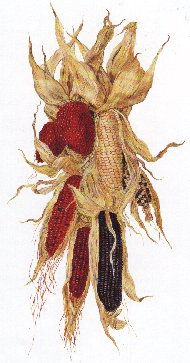 Indians had left. Without
it they would not have survived. The following spring the kernels were used for seed.
Those 10 baskets were not there by chance. He did his best to give them the means to
survive. Nothing was by coincidence. God was working very closely with them. They knew
this was a special providence of God.
Indians had left. Without
it they would not have survived. The following spring the kernels were used for seed.
Those 10 baskets were not there by chance. He did his best to give them the means to
survive. Nothing was by coincidence. God was working very closely with them. They knew
this was a special providence of God.
Bradford writes, "We had, in all, about ten bushels which will serve us
sufficiently for, seed ... it was God's good providence that we found this corn, for else
we know not how we should have done." We cannot imagine the terror and soul-searing
experience of being alone in a savage wilderness and the feelings of awe and gratitude at
how mysteriously God worked in their lives.
They put the corn into the common store "to be kept for seed". The
Pilgrims were correct in seeing everything as an intervention of God or Satan. They all
knew that this seed corn was a special providence of God. They knew that God was
intimately involved all day long in their daily lives.
Bradford said that when the search party brought some of the colorful seed corn back
to the ship it made everyone happy. He couldn't help but compare their little band
of men to the spies Moses sent into Canaan: "Like the men Moses sent to spy out
the land of Canaan, they brought with them fruits of the country and showed their
brethren. The corn and their safe return made the people marvelously glad, and their
hearts encouraged."
God was a partner who they naturally spoke to and offered everything to all day
long. God was not distant to them but intimately helping and guiding and even testing them
every moment. They understood that a religious way of life is ascetic, sacrificial, and
selfless.
Second Expedition
Bradford wrote that not only was it a miracle they found the corn but when they came
back later on the 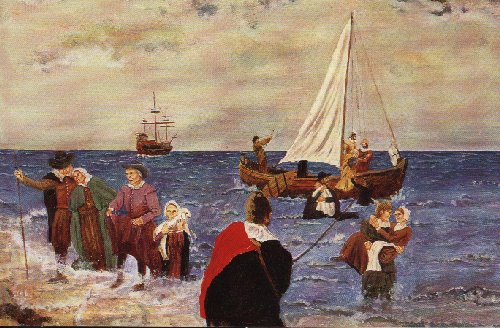 2nd
expedition, it had snowed and they saw that they would never had seen the corn if they had
come just one day later. They landed just in the nick of time. He wrote: "And here is
to be noted a special providence of God, and a great mercy to this poor people, that here
they got seed to plant them corn the next year, or else they might have starved, for they
had none nor any likelihood to get any till the season had been past, as the sequel did
manifest. Neither is it likely they had had this, if the first voyage had not been made,
for the ground was now all covered with snow and hard frozen; but the Lord is never
wanting unto His in their greatest needs; let His holy name have all the praise."
2nd
expedition, it had snowed and they saw that they would never had seen the corn if they had
come just one day later. They landed just in the nick of time. He wrote: "And here is
to be noted a special providence of God, and a great mercy to this poor people, that here
they got seed to plant them corn the next year, or else they might have starved, for they
had none nor any likelihood to get any till the season had been past, as the sequel did
manifest. Neither is it likely they had had this, if the first voyage had not been made,
for the ground was now all covered with snow and hard frozen; but the Lord is never
wanting unto His in their greatest needs; let His holy name have all the praise."
Several historians criticize Bradford and the others for taking the corn.
Bradford Smith in his book, Bradford of Plymouth, writes, "Then, with a lack
of regard for Indian property which has all too often been the white man's way of
introducing himself to a native race" ... "purloined" the corn. Those
historians who criticize the Pilgrims for this are wrong. Bradford writes that they
had every intention of paying for the corn, and he says they did so six months later to
the satisfaction of the Indians. If we see these Pilgrims from God's eyes, then it
was clearly a gift from God. I have already wrote of how we are to see the
relationship between the white man and the Indian earlier.
Third and final Expedition
After the second exploration they felt that they needed to make a third one and
search farther up the coast until they found the right spot to build their
community. They had to wait for a while until the shallop got repairs. Finally
they set out and went up the coast. Once they saw about a dozen Indians. At
night they would make a shelter out of logs and pine boughs and took turns as
sentries. One morning at five o'clock they were attacked. They had just
finished prayers (which the men always did every morning and evening) and were preparing
breakfast and loading the shallop. Arrows whizzed around them. There was
terrifying blood curdling screams from the Indians. After a fierce exchange, the
Indians retreated. Standish took some of the men and chased after them into the
woods about a quarter of a mile. They shouted at the Indians to show them that they
were "not afraid of them or any way discouraged." When they came back they were
all amazed to see that their coats had been hanging in the barricade and were riddled with
arrows and many arrows lying all around. Miraculously no one had even a scratch and
they prayed and thanked God for their deliverance.
They continued on their search for the best place to build their community. As
they traveled in the shallop they encountered foul weather - rain and snow, and then there
rudder was lost in the stormy, rough sea. Edward Winslow wrote that "the water froze
on our clothes, and made them like coats of iron." They struggled with oars to guide
the boat. When they raised the sail it broke into three pieces and they almost
capsized. They were in a very dangerous situation. Even their eyelids were
almost froze shut. Some men fainted from the cold and strain. Then they had to
wade to shore which caused them to get wet in the icy waters from the waist down and this
made them even cough more. Many became "sick unto death." Bradford
said that this was where many of the men took "the original of their death
here." They finally got a fire going in spite of the downpour, the wind and the
wet tinder.
After exploring the area for days they finally decided on Plymouth because 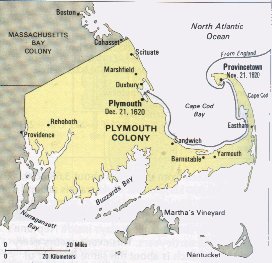 there were cleared cornfields
"that had been abandoned for several years" and ready for tillage, and the
absence of Indians. Bradford writes, "On Monday they sounded the harbor and found it
fit for shipping, and marched into the land and found divers cornfields and little running
brooks, a place (as they supposed) fit for situation. At least it was the best they could
find, and the season and their present necessity made them glad to accept of it. So they
returned to their ship again with this news to the rest of their people, which did much
comfort their hearts."
there were cleared cornfields
"that had been abandoned for several years" and ready for tillage, and the
absence of Indians. Bradford writes, "On Monday they sounded the harbor and found it
fit for shipping, and marched into the land and found divers cornfields and little running
brooks, a place (as they supposed) fit for situation. At least it was the best they could
find, and the season and their present necessity made them glad to accept of it. So they
returned to their ship again with this news to the rest of their people, which did much
comfort their hearts."
Bradford’s wife
When the search party returned, 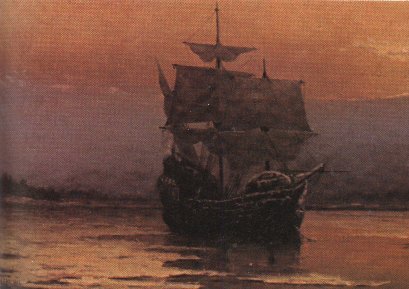 Bradford was given the sad news that his wife Dorothy had died while he was
discovering Plymouth. Tragically his wife had died in a fall overboard and drowned
before even setting foot in America. Many historians believe she committed suicide.
Bradford mentions it only briefly and never writes of his wife again. If she did commit
suicide it would have been a great disgrace. They did not believe in suicide. It was a
great sin. True religious people understand that suicide is very wrong.
Bradford was given the sad news that his wife Dorothy had died while he was
discovering Plymouth. Tragically his wife had died in a fall overboard and drowned
before even setting foot in America. Many historians believe she committed suicide.
Bradford mentions it only briefly and never writes of his wife again. If she did commit
suicide it would have been a great disgrace. They did not believe in suicide. It was a
great sin. True religious people understand that suicide is very wrong.
On the Sunday before they entered Plymouth they rested to honor the Sabbath and
prayed and dried out their guns. They were men of God, and it is God's will that
godly men use guns when necessary. There is truth in the famous saying: "Put
your trust in God; but mind to keep your powder dry."
One night while the Mayflower was tossing and rolling and straining
at her anchors in the middle of a fierce storm, Mary Allerton, wife of Isaac the tailor,
delivered a son "but dead born."



 which the ship was shrewdly
shaken", in Bradford's typically lucid style. The screaming wind, tossing the
Mayflower, terrified the Pilgrims. They became exhausted. They were chilled to the bone.
Waves of icy water would splash over the ill and frightened passengers, tasting like
tears, their hearts pounding as mountains of water pounded the tiny ship. Water crashed
about everywhere, and the foul smells reeking among the huddled people made them all sick.
It was almost impossible to sleep and every ragged nerve begged for rest.
which the ship was shrewdly
shaken", in Bradford's typically lucid style. The screaming wind, tossing the
Mayflower, terrified the Pilgrims. They became exhausted. They were chilled to the bone.
Waves of icy water would splash over the ill and frightened passengers, tasting like
tears, their hearts pounding as mountains of water pounded the tiny ship. Water crashed
about everywhere, and the foul smells reeking among the huddled people made them all sick.
It was almost impossible to sleep and every ragged nerve begged for rest. 
 November 21.
They had arrived in the dead of winter. The first thing they did was fall on their
knees and praise God. Bradford writes these famous words: "Being thus arrived
in a good harbor, and brought safe to land, they fell upon their knees and blessed the God
of Heaven who had brought them over the vast and furious ocean, and delivered them from
all the perils and miseries thereof."
November 21.
They had arrived in the dead of winter. The first thing they did was fall on their
knees and praise God. Bradford writes these famous words: "Being thus arrived
in a good harbor, and brought safe to land, they fell upon their knees and blessed the God
of Heaven who had brought them over the vast and furious ocean, and delivered them from
all the perils and miseries thereof."  sustain them but the Spirit of God and His grace? May not and ought not the children of
these fathers rightly say: ‘Our fathers were Englishmen which came over this great
ocean, and were ready to perish in this wilderness; but they cried unto the Lord, and He
heard their voice and looked on their adversity,’... ‘Let them therefore
praise the Lord, because He is good: and His mercies endure forever.’ ‘Yea, let
them which have been redeemed of the Lord, show how He hath delivered them from the hand
of the oppressor. When they wandered in the desert wilderness out of the way, and found no
city to dwell in, both hungry and thirsty, their soul was overwhelmed in them. Let them
confess before the Lord His loving kindness and His wonderful works before the sons of
men.’"
sustain them but the Spirit of God and His grace? May not and ought not the children of
these fathers rightly say: ‘Our fathers were Englishmen which came over this great
ocean, and were ready to perish in this wilderness; but they cried unto the Lord, and He
heard their voice and looked on their adversity,’... ‘Let them therefore
praise the Lord, because He is good: and His mercies endure forever.’ ‘Yea, let
them which have been redeemed of the Lord, show how He hath delivered them from the hand
of the oppressor. When they wandered in the desert wilderness out of the way, and found no
city to dwell in, both hungry and thirsty, their soul was overwhelmed in them. Let them
confess before the Lord His loving kindness and His wonderful works before the sons of
men.’"  were outside Virginia. They were
in New England. The Pilgrims would not allow for mutiny or disunity. They formed a hasty
conference. They borrowed Captain Jones’s cabin. William Brewster brought his writing
materials. Those who plotted mutiny could hear their voices and the scrabble of a quill
pen. Then the Pilgrims gathered the other men.
were outside Virginia. They were
in New England. The Pilgrims would not allow for mutiny or disunity. They formed a hasty
conference. They borrowed Captain Jones’s cabin. William Brewster brought his writing
materials. Those who plotted mutiny could hear their voices and the scrabble of a quill
pen. Then the Pilgrims gathered the other men.  by the
Grace of God of Great Britain, France, and Ireland King, Defender of the Faith, etc."
by the
Grace of God of Great Britain, France, and Ireland King, Defender of the Faith, etc."

 Indians had left. Without
it they would not have survived. The following spring the kernels were used for seed.
Those 10 baskets were not there by chance. He did his best to give them the means to
survive. Nothing was by coincidence. God was working very closely with them. They knew
this was a special providence of God.
Indians had left. Without
it they would not have survived. The following spring the kernels were used for seed.
Those 10 baskets were not there by chance. He did his best to give them the means to
survive. Nothing was by coincidence. God was working very closely with them. They knew
this was a special providence of God.  2nd
expedition, it had snowed and they saw that they would never had seen the corn if they had
come just one day later. They landed just in the nick of time. He wrote: "And here is
to be noted a special providence of God, and a great mercy to this poor people, that here
they got seed to plant them corn the next year, or else they might have starved, for they
had none nor any likelihood to get any till the season had been past, as the sequel did
manifest. Neither is it likely they had had this, if the first voyage had not been made,
for the ground was now all covered with snow and hard frozen; but the Lord is never
wanting unto His in their greatest needs; let His holy name have all the praise."
2nd
expedition, it had snowed and they saw that they would never had seen the corn if they had
come just one day later. They landed just in the nick of time. He wrote: "And here is
to be noted a special providence of God, and a great mercy to this poor people, that here
they got seed to plant them corn the next year, or else they might have starved, for they
had none nor any likelihood to get any till the season had been past, as the sequel did
manifest. Neither is it likely they had had this, if the first voyage had not been made,
for the ground was now all covered with snow and hard frozen; but the Lord is never
wanting unto His in their greatest needs; let His holy name have all the praise."
 there were cleared cornfields
"that had been abandoned for several years" and ready for tillage, and the
absence of Indians. Bradford writes, "On Monday they sounded the harbor and found it
fit for shipping, and marched into the land and found divers cornfields and little running
brooks, a place (as they supposed) fit for situation. At least it was the best they could
find, and the season and their present necessity made them glad to accept of it. So they
returned to their ship again with this news to the rest of their people, which did much
comfort their hearts."
there were cleared cornfields
"that had been abandoned for several years" and ready for tillage, and the
absence of Indians. Bradford writes, "On Monday they sounded the harbor and found it
fit for shipping, and marched into the land and found divers cornfields and little running
brooks, a place (as they supposed) fit for situation. At least it was the best they could
find, and the season and their present necessity made them glad to accept of it. So they
returned to their ship again with this news to the rest of their people, which did much
comfort their hearts."  Bradford was given the sad news that his wife Dorothy had died while he was
discovering Plymouth. Tragically his wife had died in a fall overboard and drowned
before even setting foot in America. Many historians believe she committed suicide.
Bradford mentions it only briefly and never writes of his wife again. If she did commit
suicide it would have been a great disgrace. They did not believe in suicide. It was a
great sin. True religious people understand that suicide is very wrong.
Bradford was given the sad news that his wife Dorothy had died while he was
discovering Plymouth. Tragically his wife had died in a fall overboard and drowned
before even setting foot in America. Many historians believe she committed suicide.
Bradford mentions it only briefly and never writes of his wife again. If she did commit
suicide it would have been a great disgrace. They did not believe in suicide. It was a
great sin. True religious people understand that suicide is very wrong.